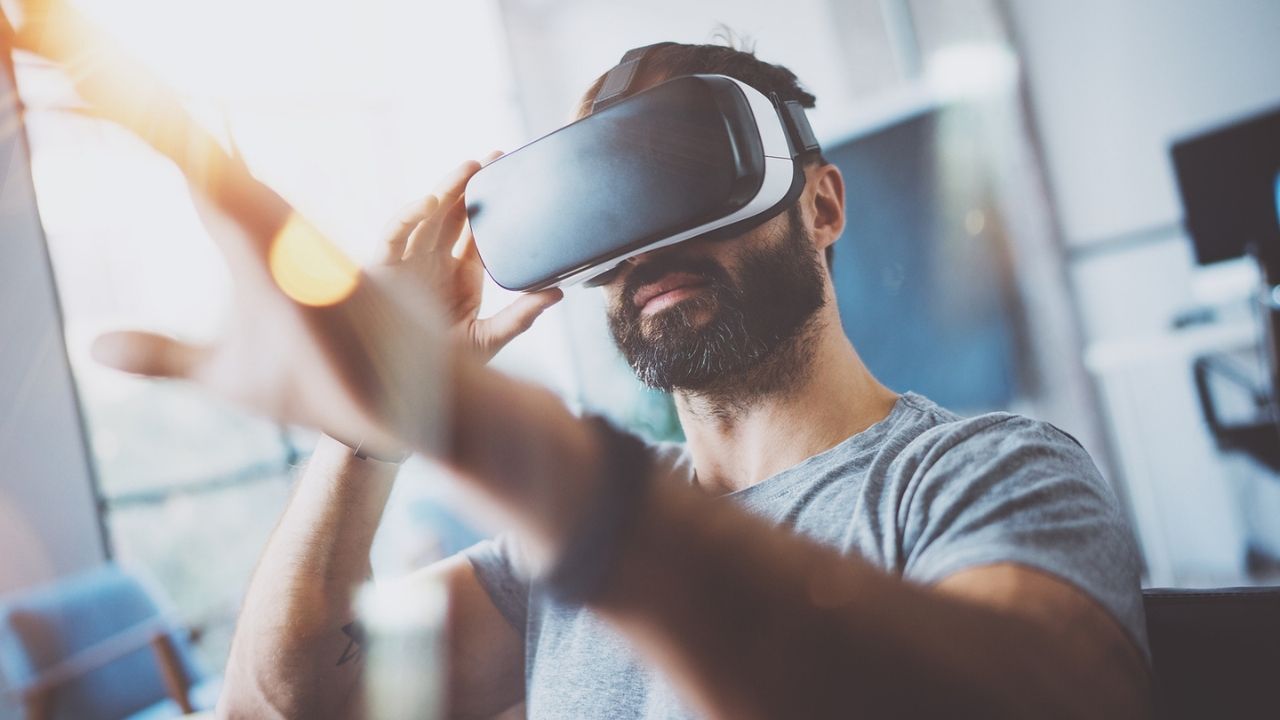- Apple’s rumoured plans to launch an AR/VR offering have hit fever pitch.
- Analysts expect Apple will ‘enter the market late but still dominate’.
- But privacy concerns may slow adoption rates, especially in workspaces.

There are many stories surrounding Apple’s much-anticipated move into the AR/VR market. Some say the company’s headsets will hit the shelves by 2022. Others expect some form of AR Smart Glasses. The smart money’s on an Apple VR/AR headset, and then smart glasses.
But, as Facebook eyes up its AR and VR for the future of work, few people are talking about the impact of Apple’s AR offering on our workplaces.
Allwork.Space spoke to Leo Gebbie, a principal analyst at specialist tech market intelligence and advisory firm CCS Insight, to find out how Apple’s AR/VR plans could impact the future of work.
Allwork.Space: VR and AR have historically low adoption rates, mainly due to the high prices and poor user experiences previous devices have provided. How can Apple stand out and succeed in this space? And what do you think we can expect from Apple’s continued efforts in the extended reality space?
Gebbie: It’s no secret that Apple has designs on extended reality. It’s already built strong credentials in terms of software with the development of its ARKit platform which allows developers to create AR apps, and rumours continue to fly about possible hardware. On this front, very little is known at present.
In my view, any VR or AR device from the company will undoubtedly offer a premium experience – and a premium price tag to go with it – and will take advantage of the company’s increasingly impressive breadth of services.
This will be key in standing out compared to rivals like Facebook, which has already become a leader in the VR space thanks to its Oculus headsets. However, we’ve seen Apple’s ability to enter a market late and still dominate it (like with wearables, where Apple Watch has defined the space), and I expect the company to tackle VR and AR in a similar fashion.
Allwork.Space: What impact will Apple’s AR system have on the future of work and the next generation of remote workers?
It’s very difficult to know how an Apple move for AR could impact the workplace because we have no idea what sort of hardware it would choose to launch. The price and specifications of a device would have a huge influence on the scale that a device could achieve, and the sort of scenarios where it could be used.
Certain use cases for AR in the enterprise have soared in popularity recently, such as remote assistance and warehouse picking, but I wouldn’t expect an Apple device to play here. Instead, I think it’s more likely that the firm would want to target more creative and engaging use cases such as remote collaboration and product design, but these are less mature applications of the technology.
Allwork.Space: How is Apple using its consumer-facing products to collect data, find tech issues, and build a user base? What do businesses need to be wary (or aware) of when introducing this technology?
More and more devices are seeking to track the environments that they operate in. The most obvious example is smart speakers, which are always listening for wake words, but cameras are also increasingly prevalent.
For example, the Oculus Quest 2 VR headset has outward-facing cameras to track a user’s play space as well as controller movement, while emerging devices like Amazon’s Astro home robot use cameras as well as advanced imaging technology like LiDAR to build complex 3D models of a user’s home.
The incredible growth in popularity of smart speakers over the last few years shows that consumers are willing to allow tech into their homes and to listen in, but I question whether there will be more backlash against cameras on emerging devices.
I’m expecting this to be a huge area of debate over the coming years, especially with products like smart glasses which may bring face-worn cameras back to the mainstream. I suspect that concerns about privacy and security may still worry the general public and slow the uptake of these new devices.
Allwork.Space: Finally, would you introduce AR to your business? If so, how?
I’m personally an AR enthusiast because I think the technology has a lot of fascinating use cases – however, I don’t think it would help me or my colleagues to be that much more productive right now.
The value of AR for businesses very much depends on the business and the specific deployment of the technology, and as someone who’s mostly a desk-based worker, there’s not much that AR could do for me.
The most likely use cases would be for AR video calls and meetings, or allowing me to use an unlimited number of virtual monitors instead of my usual laptop and second screen. Ultimately, I think those are fairly niche use cases at the moment, and AR is far more useful for mobile workers who can have their hands freed up by the technology.



 Dr. Gleb Tsipursky – The Office Whisperer
Dr. Gleb Tsipursky – The Office Whisperer Nirit Cohen – WorkFutures
Nirit Cohen – WorkFutures Angela Howard – Culture Expert
Angela Howard – Culture Expert Drew Jones – Design & Innovation
Drew Jones – Design & Innovation Jonathan Price – CRE & Flex Expert
Jonathan Price – CRE & Flex Expert










